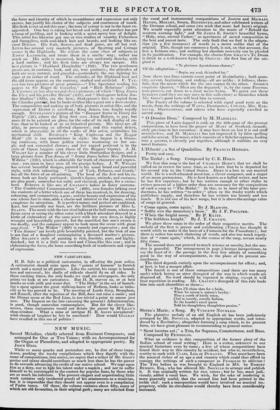NEW MUSIC.
Sacred Melodies, chiefly selected from Eminent Composers, and arranged for One or Two Voices; with an Accompaniment for the Organ or Pianoforte, and adapted to appropriate poetry. By JOHN Goss.
While so many quacks and pretenders are, by dint of sheer impu- dence, pushing the trashy compilations which they dignify with the name of compositions, into notice, we regret that a writer of Mr. Goss's genius and talent should contribute so much less than be has the power to do towards advancing the credit of our native school. We urge upon him as a duty, not to hide his talent under a napkin ; and not to suffer himself to be outstripp;c1 in the contest for popular fame, by those who are so much his inferiors. The present elegant and unpretending little work contains only incidental proofs of his attainments as a musician, but it is impossible that they should not appear even in a compilation of Psalm tunes. Of these, the volume contains about fifty, many of which are old favourites, in their original garb; many are selected from
the vocal and instrumental compositions of JOSEPH and MICHAEL HAYDN, MOZART, SPOHR, BEETHOVEN, and other celebrated writers of the German school, and some (we wish that more had been) original. We would especially point attention to the music of " Behold the western evening light," and Sir JAMES E. SMITH'S beautiful hymn, " Holy, wise, eternal Father," as specimens of sacred composition in the best and purest taste. The only fault that we find is the adapta- tion (in a few instances) of words to a metre unlike that of the original. This, though too common a fault, is not, on that account, the less a heinous one; and nothing but absolute necessity can be pleaded in its justification. For example, the chorus from GRAUN'S TB Deum is fitted to a well-known hymn by OGILVIE : the first line of the ori- ginal is " Te gloriosus Apostolorum chorus;"
Of the adaptation- " Begin, my soul, th'exaltcd lay."
Now these two lines contain every point of dissimilarity ; both quan- tity, accent, beginning, and ending—all are unlike : it follows, there- fore, that the music which fits the one cannot fit the other. Scoria's exquisite Quartet, " Blest are the departed," is, by the same Procrus- tean process, cut down to a short metre hymn. We point out these instances (and they arc rare ones in this collection) as blemishes which Mr. Goss's good taste will lead him to correct.
The Poetry of the voluine is selected with equal good taste as the music, from the writings of WATTS, DODDRIDGE, COWPER, Mrs. BAR- BAULD, MONTGO3IERY, and others who have especially excelled in sacred song.


























 Previous page
Previous page